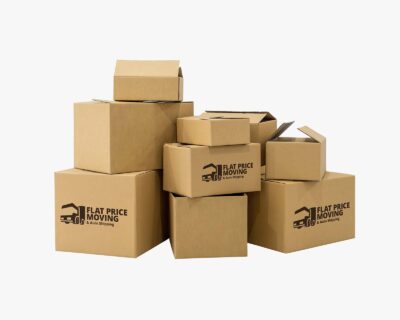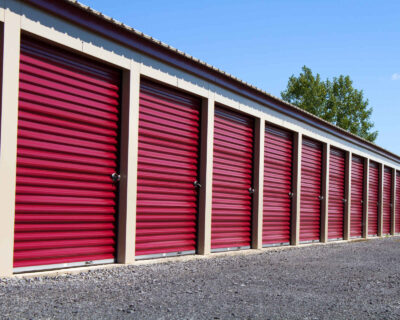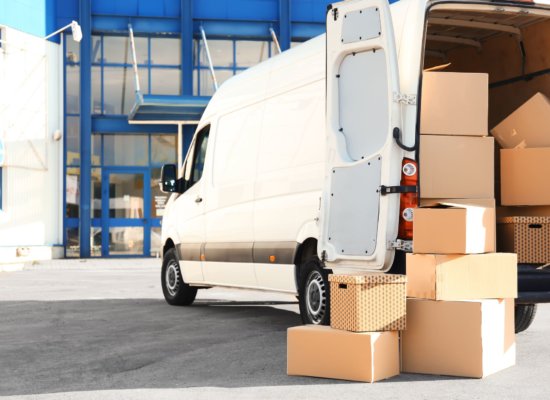Lights, Water, Action! Navigating Apartment Utilities for First-Time Renters
Moving to another state isn’t a walk in the park, especially when having to think about utilities and services in your new home. Let us help you demystify apartment utilities, offering valuable tips and insights to help you make informed decisions as you embark on an exciting journey into independent living.

As cross-country movers and experts in last-minute moving, we know that transitioning to a new living space can be thrilling and challenging, especially when trying to move out of state on a budget. This comprehensive guide will help you understand and manage the essential services that power your new home.
The Overview of Common Apartment Utilities in Rental Units
Whether you plan on moving to the suburbs or a bustling city center, understanding common apartment utilities in rentals is crucial for a seamless transition. Apartment utilities typically include electricity, gas, water, sewer, and trash removal but can also encompass additional services such as internet and cable television.
Each utility has unique considerations and costs, varying depending on your location and usage habits. Furthermore, knowing how to transfer utilities from your old residence to your new one can save you time, money, and headaches.
With adequate knowledge and preparation, you can confidently navigate through the process of setting up and managing your apartment utilities in your new rental unit.
First on the List of Utilities for Apartments – Electricity and Gas
When asking, “What utilities do apartments include?”, electricity and gas are often at the top of the list. These essential services power everything from your lights and appliances to your heating and cooling systems.
As you change your address and gather the things you need for your first apartment, it’s important to understand how electricity and gas services work in your new living space.
Determining Whether Electricity and Gas Are in the Rent
As you prepare for your move and consider what you need to rent an apartment, it’s important to clarify with your landlord or property manager whether electricity and gas are in the rent.
Some rental agreements may cover the cost of these utilities, while others may require tenants to set up and pay for their own accounts. Be sure to read your lease carefully and ask any questions you may have to avoid unexpected expenses down the road.
Tips for Energy Conservation and Lowering Bills
Moving from a house to an apartment often means adjusting to a smaller living space, and this transition can offer unique opportunities for energy conservation.
Implementing small apartment ideas for energy efficiency not only helps the environment but can also lower your monthly utility bills. Here are some tips to get you started:
- Unplug electronics when they’re not in use or use a power strip with a built-in surge protector that can be turned off to save energy,
- Replace incandescent light bulbs with energy-efficient LED bulbs,
- Seal gaps around doors and windows to prevent drafts and improve insulation,
- Use a programmable thermostat to optimize heating and cooling while you’re away or asleep,
- Wash laundry in cold water and air-dry clothes when possible.
By keeping these tips in mind, you can enjoy the benefits of a more energy-efficient apartment while saving money on your utility bills.

Water and Sewer Are Essential Utilities
No matter what state people are relocating to, water and sewer are essential utilities for any apartment dweller. These services provide clean water for drinking, cooking, bathing, and other daily activities while ensuring the proper disposal of wastewater.
Like electricity and gas, the responsibility for water and sewer bills can vary depending on the rental agreement and location.
Assessing the Responsibility for Water and Sewer Bills
Before signing a lease or agreeing to a rental arrangement, it’s crucial to determine who is responsible for the water and sewer bills. This is one of the important questions to ask potential roommates or landlords, as it can significantly impact your monthly expenses.
In some cases, the landlord may include water and sewer charges in the rent, while in others, the tenant will be responsible for setting up an account and paying the bills directly. Be sure to clarify this aspect of your rental agreement to avoid surprises and budget appropriately.
Conserving Water to Reduce Costs
Relocating to a new city alone in your 20s can be an exciting and challenging experience. One way to reduce expenses and make the most of your new living situation is by conserving water.
Here are some tips for water conservation that can help lower your monthly bills:
- Fix any leaks in faucets, toilets, or pipes as soon as you notice them,
- Install low-flow fixtures, such as showerheads and faucet aerators, to reduce water usage,
- Only run your dishwasher and washing machine with full loads to maximize efficiency,
- Collect rainwater for outdoor watering or use a broom instead of a hose to clean sidewalks and driveways,
- Turn off the faucet while brushing your teeth or washing dishes to minimize water waste.
By implementing these water-saving strategies, you can contribute to environmental conservation while reducing your water and sewer bills.
Utility Bills Often Include Trash and Recycling
When moving into an apartment, remember that utility bills often include charges for trash and recycling services. These fees cover the regular collection, disposal of waste, and recyclable materials processing. Depending on your rental agreement and location, the cost of trash and recycling services may be included in your rent or billed separately.
Learning Local Recycling Guidelines and Sorting Waste Properly
As you move safely into your new home, you should familiarize yourself with the local recycling guidelines. Properly sorting your waste contributes to a greener environment, helping you avoid fines or penalties for incorrect disposal.
You can always check websites like Call 2 Recycle for details on recycling according to state and instructions on recycling and disposing of unwanted materials.
Here are some general tips to help you manage your trash and recycling effectively:
- Research your city’s recycling guidelines, as they can vary from one municipality to another,
- Separate recyclable materials, such as paper, plastic, glass, and metal, according to your city’s requirements,
- Rinse out containers and remove any food residue before placing them in the recycling bin,
- Flatten cardboard boxes and other large recyclables to save space in your bin,
- Dispose of hazardous materials, such as batteries, electronics, and chemicals, according to local regulations.
By learning and following your city’s recycling guidelines, you can do your part to reduce waste and contribute to a more sustainable community.

Renters Get Their Own Internet and Cable
As you coordinate with a long-distance moving company and prepare your packing list for your upcoming move, consider your internet and cable needs. Unlike other utilities, renters typically need to set up their own accounts for internet and cable services.
This can be great for you since the process lets you choose the provider and package that best suit your preferences and budget. Some people don’t like TVs or can’t afford them, so having a cable and internet package would defeat the purpose – and burden your wallet.
Here are some steps to help you get connected once you’ve settled in and started to unpack after moving:
- Research available internet and cable providers in your area, comparing their plans, pricing, and customer reviews to find the best fit for your needs,
- Consider your usage habits and requirements, such as streaming video, online gaming, or working from home, to determine the appropriate speed and bandwidth for your internet connection,
- Contact your chosen provider to set up an installation appointment. Be sure to ask about any promotions, discounts, or bundled services that could save you money,
- Keep track of installation fees, equipment rental charges, or other costs associated with setting up your internet and cable services. Include these in your monthly budget to ensure you’re prepared for any changes in your expenses,
- Familiarize yourself with your provider’s customer service and technical support options so you know who to contact in case of any issues or service interruptions.
By following these steps, you can enjoy a seamless transition to your new home and stay connected with the world through your internet and cable services.
Moving Services
Whether you are moving from New York to Los Angeles or from San Francisco to Chicago, we can help you.
Read morePacking Services
Our moving teams are trained to pack your belongings in the most efficient manner possible.
Read moreStorage Service
Knowing what kind of surprises cross country move may hold, we offer 30 day free storage for belongings at the origin state.
Read moreHow to Get Renters’ Insurance and How It Works
As you prepare to clean an apartment before moving in and coordinate with long-distance moving services, consider renters insurance. Renters’ insurance provides financial protection for your personal belongings and liability coverage in case of injuries on your property.
It can also cover additional living expenses if your rental unit becomes uninhabitable due to a covered event, such as a fire or storm.
Comparing Insurance Providers and Choosing the Right Coverage
To find the best renters insurance policy for your needs, you should obtain quotes from multiple insurance providers to compare rates and coverage options. Be sure to consider factors like the deductible, coverage limits, and any exclusions that may apply.
Take inventory of your personal belongings and estimate their total value to determine the appropriate level of coverage. This will help you select a policy that provides adequate protection for your possessions without overpaying for unnecessary coverage.
Depending on the circumstances, you may want to add endorsements or riders to your policy for extra protection. Examples of additional coverage include flood insurance, earthquake insurance, or coverage for high-value items such as jewelry or electronics.
Look for customer reviews and ratings to gauge the company’s reputation for customer service, claims processing, and overall satisfaction. This can help you choose a reliable provider that will be there when you need them.
Familiarize yourself with the claims process for each insurance provider you’re considering. This includes understanding how to file a claim, what documentation is required, and how quickly claims are typically processed. A clear understanding of the claims process will help ensure a smoother experience if you ever need to file a claim.
If you already have other types of insurance, you could bundle your renters’ insurance with the same provider to save on premiums. Many insurance companies offer discounts for bundling multiple policies, so it’s worth exploring this option.
The video below explains renters insurance in five minutes with plenty of details for choosing the best provider.
Communicate With Landlords and Property Managers
As you prepare for cross-country moving and learn how to pack a moving truck, one of the crucial aspects of your transition is establishing good communication with your landlord or property manager. That will help you navigate your new living situation and understand your renter rights and responsibilities.
Understanding Your Rights and Responsibilities as a Renter
Being aware of your rights and responsibilities as a tenant is essential for maintaining a positive relationship with your landlord and property manager. Here are some key points to keep in mind:
- Different states and cities have unique laws and regulations that govern rental properties. Research local landlord-tenant laws to understand your and your landlord’s rights and responsibilities.
- Your lease is a legally binding agreement between you and your landlord. It outlines the terms and conditions of the rental, including maintenance, rent payments, and other obligations. Read and understand your lease before signing, and ask for clarification on unclear points.
- Keep your landlord or property manager informed of issues or concerns, like maintenance requests or problems with neighbors. Prompt and open communication can resolve issues quickly and prevent misunderstandings or disputes.
- Treat your rental unit and common areas carefully, keeping them clean and well-maintained. This will preserve your relationship with your landlord and protect your security deposit.
- Adhere to the terms of your lease and community rules or regulations. This includes paying rent on time, avoiding excessive noise or disturbances, and complying with any other requirements outlined in your lease or by your landlord.
Hire Long-Distance Movers and a Car Shipping Company to Move to Your New Apartment
When embarking on a long-distance move to a new apartment, hiring professional movers and an auto transport company can save you time, energy, and stress. The benefits of car shipping include secure transportation, vehicle protection, and the convenience of door-to-door service.
As you navigate apartment utilities and settle into your new home, trust Flat Price Moving and Auto Shipping to provide expert services and reliable car shipping service solutions.
Don’t wait any longer – contact Flat Price Moving and Auto Shipping today and make your move a seamless and hassle-free experience.
FAQ
What Are the Most Common Apartment Utilities That Renters Are Responsible For?
The most common apartment utility renters are responsible for electricity, gas, water, sewer, trash and recycling services, and internet and cable.
How Can I Determine Which Utilities Are Included in My Rent?
Review your lease agreement or consult your landlord or property manager to determine which utilities are included in your rent and which ones you’ll be responsible for separately.
How Do I Set up Accounts With Utility Providers for Electricity, Gas, and Water?
Contact the utility providers serving your apartment and provide your personal information, rental address, and move-in date to set up new accounts. Your landlord or property manager can help you identify the correct providers.
What Factors Should I Consider When Choosing an Internet and Cable Service Provider for My Apartment?
Consider pricing, available plans, speed and bandwidth, customer reviews, and promotional offers when choosing an internet and cable service provider.
How Can I Conserve Energy and Water to Reduce Utility Costs in My Apartment?
Implement energy- and water-saving measures such as using energy-efficient appliances, fixing leaks, installing low-flow fixtures, and turning off lights and electronics when not in use.
What Are Some Common Energy-Efficient Appliances or Upgrades That Can Help Lower Utility Bills?
Energy-efficient appliances and upgrades include LED lighting, Energy Star-rated appliances, programmable thermostats, and insulation improvements.
How Do Trash and Recycling Services Typically Work in Apartment Complexes?
Trash and recycling services are often provided by the apartment complex or a contracted waste management company. Residents are responsible for properly sorting and disposing of their trash and recyclables according to local guidelines.
What Is Renters Insurance and How Does It Relate to Utility-Related Incidents?
Renters insurance provides financial protection for your personal belongings and liability coverage if someone is injured on your property. It can also cover additional living expenses if your rental unit becomes uninhabitable due to a covered event, such as a fire or storm, which may be related to utility incidents.
How Can I Monitor My Utility Usage and Adjust It to Save Money?
Monitor your utility usage by reviewing your monthly bills and consumption patterns. Use this information to identify areas where you can reduce usage, like turning off lights, unplugging electronics, adjusting the thermostat, or using water-saving devices.
What Are My Rights and Responsibilities as a Renter When It Comes to Utility Issues or Disputes?
As a renter, you have the right to a safe and habitable living space, including functioning utilities. You’re responsible for adhering to the terms of your lease, including paying for utilities not covered by your rent. If utility issues or disputes arise, consult your lease agreement and local landlord-tenant laws to understand your rights and responsibilities.










